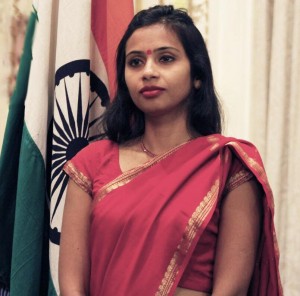Khobragade to appear in NY court later today.
LIKE US ON FACEBOOK; FOLLOW US ON TWITTER
By Sujeet Rajan
 NEW YORK: In a shocking case that is going to pose a lot of legal and diplomatic wrangling in the days ahead, and could color relations between India and the United States, Dr. Devyani Khobragade, the Deputy Consul General of India at the Indian Consulate in New York, has been arrested in New York for an alleged case of visa fraud and making false statements in connection with the visa application for an employee from India who did household and babysitting work.
NEW YORK: In a shocking case that is going to pose a lot of legal and diplomatic wrangling in the days ahead, and could color relations between India and the United States, Dr. Devyani Khobragade, the Deputy Consul General of India at the Indian Consulate in New York, has been arrested in New York for an alleged case of visa fraud and making false statements in connection with the visa application for an employee from India who did household and babysitting work.
| Related stories |
Although details are forthcoming, it seems as if the hired help from India lodged a complaint with the authorities for being paid less than was promised to her by Khobragade.
According to an announcement today by Preet Bharara, the United States Attorney for the Southern District of New York, Khobragade was arrested as she allegedly caused a materially false and fraudulent document to be presented, and materially false and fraudulent statements to be made, to the United States Department of State in support of a visa application for an Indian national employed as a babysitter and housekeeper at her home in New York City.
Khobragade is currently employed as the Deputy Consul General for Political, Economic, Commercial and Women’s Affairs at the Consulate General of India in New York.
“Foreign nationals brought to the United States to serve as domestic workers are entitled to the same protections against exploitation as those afforded to United States citizens. The false statements and fraud alleged to have occurred here were designed to circumvent those protections so that a visa would issue for a domestic worker who was promised far less than a fair wage. This type of fraud on the United States and exploitation of an individual will not be tolerated,” said Bharara in a statement.
According to the allegations in the criminal complaint unsealed today in Manhattan federal court:
Diplomats and consular officers may obtain A-3 visas for their personal employees, domestic workers, and servants if they meet the requirements set out in 9 Foreign Affairs Manual (FAM) 41.22. As part of the application process, an interview at the embassy or consulate is required. Proof is required that the applicant will receive a fair wage, sufficient to support himself financially, comparable to that being offered in the area of employment in the U.S. To apply for an A-3 visa, the visa applicant must submit an employment contract signed by both the employer and the employee which must include, among other things, a description of duties, hours of work, the hourly wage – which must be the greater of the minimum wage under U.S. federal and state law, or the prevailing wage – for all working hours, overtime work, and payment.
The allegations say: Khobragade prepared and electronically submitted an application for an A-3 visa (the “Visa Application”) through the website for the U.S. Department of State’s Consular Electronic Application Center for an Indian national ( according to “Witness-1”), who was to be the personal employee of Khobragade beginning in November 2012 at an address in New York.
The allegations say: The Visa Application stated that Witness-1 was to be paid $4,500 per month in U.S. dollars. KHOBRAGADE and Witness-1 also signed an employment contract (the “First Employment Contract”) for Witness-1 to bring to Witness-1’s interview at the U.S. Embassy in India in connection with the Visa Application, which Witness-1 did at Khobragade’s direction. The First Employment Contract stated, among other things, that Khobragade would pay Witness-1 the prevailing or minimum wage, whichever is greater, resulting in an hourly salary of $9.75.
According to the allegations, Khobragade knew that the First Employment Contract that she caused Witness-1 to submit to the U.S. State Department in connection with Witness-1’s Visa Application contained materially false and fraudulent statements about, among other things, Witness-1’s hourly wage and hours worked.
Prior to the signing of the First Employment Contract, the allegations say, Khobragade and Witness-1 had agreed that Khobragade would pay 30,000 rupees per month, which at the time was equivalent to $573.07. At 40 hours per week, with approximately 4.3 weeks in a month, $573.07 equates to a rate of $3.31 per hour. However, the complaint says, Khobragade instructed Witness-1 to say that she would be paid $9.75 per hour, and not to say anything about being paid 30,000 rupees per month. Khobragade also instructed Witness-1 to say that Witness-1 would work 40 hours per week, and that Witness-1’s duty hours would be 7 a.m. to 12:30 p.m., and 6:30 p.m. to 8:30 p.m. She told Witness-1 that the First Employment Contract was a formality to get the visa.
The allegations says, after the First Employment Contract was submitted to the United States Department of State, Khobragade told Witness-1 that Witness-1 needed to sign another employment contract (the “Second Employment Contract”).
Khobragade and Witness-1 signed the Second Employment Contract, which provided that Witness-1’s maximum salary per month including overtime allowance will not exceed 30,000 rupees per month. The Second Employment Contract does not contain any provision about the normal number of working hours per week or month.
Witness-1 worked for Khobragade as a household employee in New York, from approximately November 2012 through approximately June 2013. Notwithstanding the terms of the First Employment Contract, Witness-1 worked far more than 40 hours per week, and Witness-1 was paid less than $9.75 per hour by Khobragade. In fact, the allegations says, notwithstanding the terms of the oral agreement between Khobragade and Witness-1 and the terms of the Second Employment Contract, Witness-1 was paid less than 30,000 rupees per month, or $3.31 per hour.
Khobragade was charged with one count of visa fraud and one count of making false statements, which carry maximum sentences of ten years and five years in prison, respectively. She is expected to appear this afternoon before U.S. Magistrate Judge Debra Freeman.
The release from Bharara’s office also said that he “thanked the Department of Justice’s Human Trafficking Prosecution Unit for playing an integral role in this investigation, and for providing ongoing support in this prosecution.”
The New York Indian Consulate has faced other such cases involving hired help from India. In the recent past, Dr. Neenal Malhotra, a Consul at the Consulate, and then Prabhu Dayal, the Consul General of India and his family were mired in legal cases alleging domestic abuse. Both of them, however, were never threatened with arrest. Malhotra was in fact indicted in a court, and ordered to pay a million dollar plus fine, but by that time was already in India on her next posting, and works for the ministry in New Delhi now, while Dayal retired earlier this year.
With an arrest of an Indian diplomat though, things are different now, and it remains to be seen how India will take up this issue and there question of diplomatic immunity with the US government.
To contact the author, email to sujeetrajan@americanbazaaronline.com



